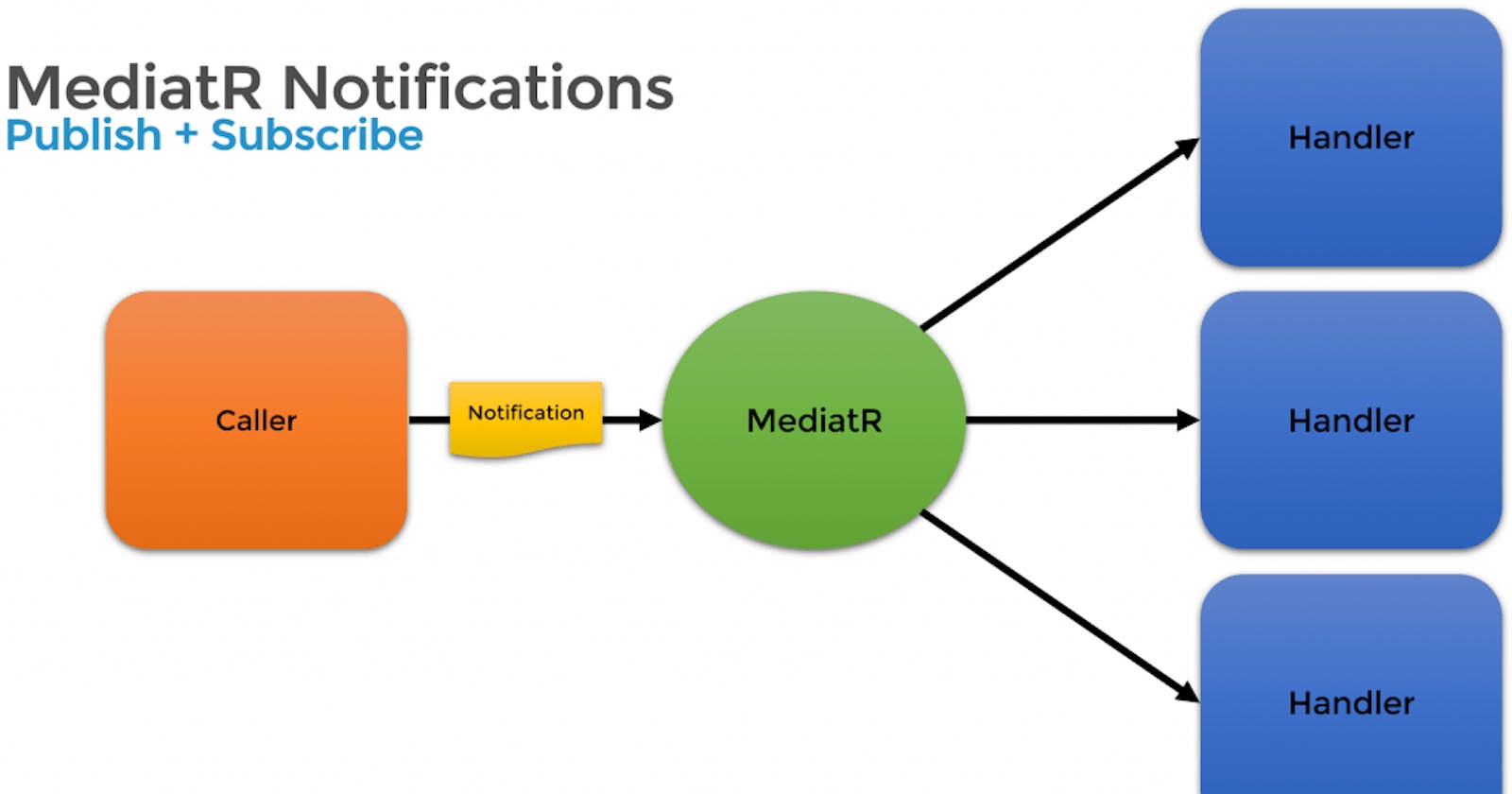Table of contents
No headings in the article.
In this article, we will look at how to create a notification library in .NET Core inspired by the popular MediatR library. We will start by defining the core interfaces that make up the notification system, and then we will build a mediator class that can handle and dispatches notifications to the appropriate handlers. Finally, we will see how to use dependency injection to register and use the notification system in a .NET Core application.
You can find the source code for the MediatR-inspired notification library and the complete project on my GitHub page at the following link:
github.com/vamcan/MyMediatR-Notification
First, create a class called
INotificationthat serves as the base interface for all notifications. This interface should not have any method:public interface INotification { }Next, create a generic interface called
INotificationHandler<T>that defines a single method,Handle, that takes aT(which should be anINotification) as an argument:public interface INotificationHandler<in T> where T : INotification { Task Handle(T notification); }You can then create concrete implementations of
INotificationby defining classes that implement theINotificationinterface. For example:public class UserCreatedNotification : INotification { public string Email { get; set; } public string Password { get; set; } }You can also create concrete implementations of
INotificationHandler<T>by defining classes that implement theINotificationHandler<T>interface. For example:public class UserCreatedNotificationHandler : INotificationHandler<UserCreatedNotification> { public async Task Handle(UserCreatedNotification notification) { // Perform some action when a UserCreatedNotification is received } }Finally, you can create an interface and class that serve as a central "mediator" for handling notifications. This class should have a method for registering
INotificationHandler<T>implementations and a method for publishingINotificationobjects to be handled:```csharp
public interface INotificationMediator { void Register<T>(INotificationHandler<T> handler) where T : INotification; Task Publish<T>(T notification) where T : INotification; }
public class NotificationMediator : INotificationMediator
{
private readonly ConcurrentDictionary<Type, List<object>> _handlers = new ConcurrentDictionary<Type, List<object>>();
public void Register<T>(INotificationHandler<T> handler) where T : INotification
{
var notificationType = typeof(T);
if (!_handlers.ContainsKey(notificationType))
{
_handlers[notificationType] = new List<object>();
}
_handlers[notificationType].Add(handler);
}
public async Task Publish<T>(T notification) where T : INotification
{
var notificationType = typeof(T);
if (_handlers.ContainsKey(notificationType))
{
foreach (INotificationHandler<T> handler in _handlers[notificationType])
{
await handler.Handle(notification);
}
}
}
}
```
- You can then use the
NotificationMediatorclass to registerINotificationHandler<T>implementations and publishINotificationobjects as follows:
// Create a notification mediator
var mediator = new NotificationMediator();
// Register a notification handler
mediator.Register(new UserCreatedNotificationHandler());
// Create and publish a notification
await mediator.Publish(new UserCreatedNotification
{
Email = "Reza@example.com",
Password = "password"
});
This code will create a new NotificationMediator and register an instance of UserCreatedNotificationHandler with it. Then, it will create a new UserCreatedNotification and publish it to the mediator, which will in turn call the Handle method on the registered UserCreatedNotificationHandler instance.
you might want register your notification library as a service in the ConfigureServices method of your Startup class and scan for and register all INotificationHandler<T> implementations in an assembly :
public static void AddMyNotificationMediator(this IServiceCollection services, Assembly assembly)
{
var notificationMediator = new NotificationMediator();
var notificationHandlerTypes = assembly
.GetExportedTypes()
.Where(x => x.GetInterfaces().Any(y => y.IsGenericType && y.GetGenericTypeDefinition() == typeof(INotificationHandler<>)));
foreach (var notificationHandlerType in notificationHandlerTypes)
{
var notificationType = notificationHandlerType.GetInterfaces().First().GetGenericArguments().First();
var registerMethod = typeof(NotificationMediator).GetMethod("Register").MakeGenericMethod(notificationType);
registerMethod.Invoke(notificationMediator, new object[] { Activator.CreateInstance(notificationHandlerType) });
}
services.AddSingleton<INotificationMediator>(notificationMediator);
}
This code will register your NotificationMediator as a singleton service, and will find all types in the specified assembly that implement INotificationHandler<T> and register them
Then you should register it in Program.cs
// Get the assembly that contains your notification handlers
var assembly = Assembly.GetExecutingAssembly();
//Register Our Service
builder.Services.AddMyNotificationMediator(assembly);
You can then inject the INotificationMediator into your controllers or other classes using dependency injection:
public class SomeController : Controller
{
private readonly NotificationMediator _mediator;
public SomeController(NotificationMediator mediator)
{
_mediator = mediator;
}
[HttpGet("SendNotification")]
public async Task<IActionResult> SendNotification()
{
// Create and publish a notification
await _mediator.Publish(new UserCreatedNotification
{
Email = "Reza@example.com",
Password = "password"
});
return Ok();
}
}
You can find the source code for the MediatR-inspired notification library and the complete project on my GitHub page at the following link:
https://github.com/vamcan/MyMediatR-Notification
Please give it a star if you found it useful :)
Let me know if you have any questions. :)

